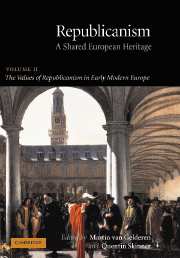Book contents
- Frontmatter
- Contents
- Contents of Volume I
- Acknowledgments
- Introduction
- Part I Republicanism and Political Values
- Part II The Place of Women in the Republic
- Part III Republicanism and the Rise of Commerce
- 10 Republicanism and Commercial Society in the Scottish Enlightenment: The Case of Adam Ferguson
- 11 Scots, Germans, Republic and Commerce
- 12 Neo-Roman Republicanism and Commercial Society: The Example of Eighteenth-century Berne
- 13 Republicanism and Commercial Society in Eighteenth-century Italy
- 14 Republicanism, State Finances and the Emergence of Commercial Society in Eighteenth-century France – or from Royal to Ancient Republicanism and Back
- 15 Commercial Realities, Republican Principles
- Bibliography
- Contributors
- Index of Names of Persons
- Index of Subjects
13 - Republicanism and Commercial Society in Eighteenth-century Italy
Published online by Cambridge University Press: 11 January 2010
- Frontmatter
- Contents
- Contents of Volume I
- Acknowledgments
- Introduction
- Part I Republicanism and Political Values
- Part II The Place of Women in the Republic
- Part III Republicanism and the Rise of Commerce
- 10 Republicanism and Commercial Society in the Scottish Enlightenment: The Case of Adam Ferguson
- 11 Scots, Germans, Republic and Commerce
- 12 Neo-Roman Republicanism and Commercial Society: The Example of Eighteenth-century Berne
- 13 Republicanism and Commercial Society in Eighteenth-century Italy
- 14 Republicanism, State Finances and the Emergence of Commercial Society in Eighteenth-century France – or from Royal to Ancient Republicanism and Back
- 15 Commercial Realities, Republican Principles
- Bibliography
- Contributors
- Index of Names of Persons
- Index of Subjects
Summary
In the eighteenth century, before the treaty of Aix-la-Chapelle was signed in 1748, Italy was made up of states large and small, a kaleidoscope which coalesced and dissolved continually in accordance with the ever-changing alliances between the monarchies of Europe. Whereas those actively engaged in the practice of politics took good care to adapt to the changes, the literati showed a tendency to search for common themes with a view to launching a debate in opposition to the armed might of the victorious powers. That explains why, in the context of the highly varied situation that pertained in Italy, they found in the republican tradition an important element of cohesion, based on two factors: the first arising from the palpable existence of concrete realities – in the shape of states like Venice, Lucca, Genoa and San Marino – which offered living proof of the resistance offered by the republican form of government to the monarchical system of the great kingdoms of Europe; and the second, of a cultural nature, deriving from the memory of republican Rome transmitted through the literary genres and styles of the local academies in accordance with the tired gestures of academic life, enlivened from time to time by an occasional burst of energy.
But if republican sentiment had difficulty, understandably, in fulfilling the role of guardian of republican memory whilst striving to accommodate itself to conditions of everyday reality, it did not find it any easier to foster a lively ideological debate, and even less to transform itself into a fully elaborated system.
- Type
- Chapter
- Information
- RepublicanismA Shared European Heritage, pp. 249 - 274Publisher: Cambridge University PressPrint publication year: 2002
- 1
- Cited by



